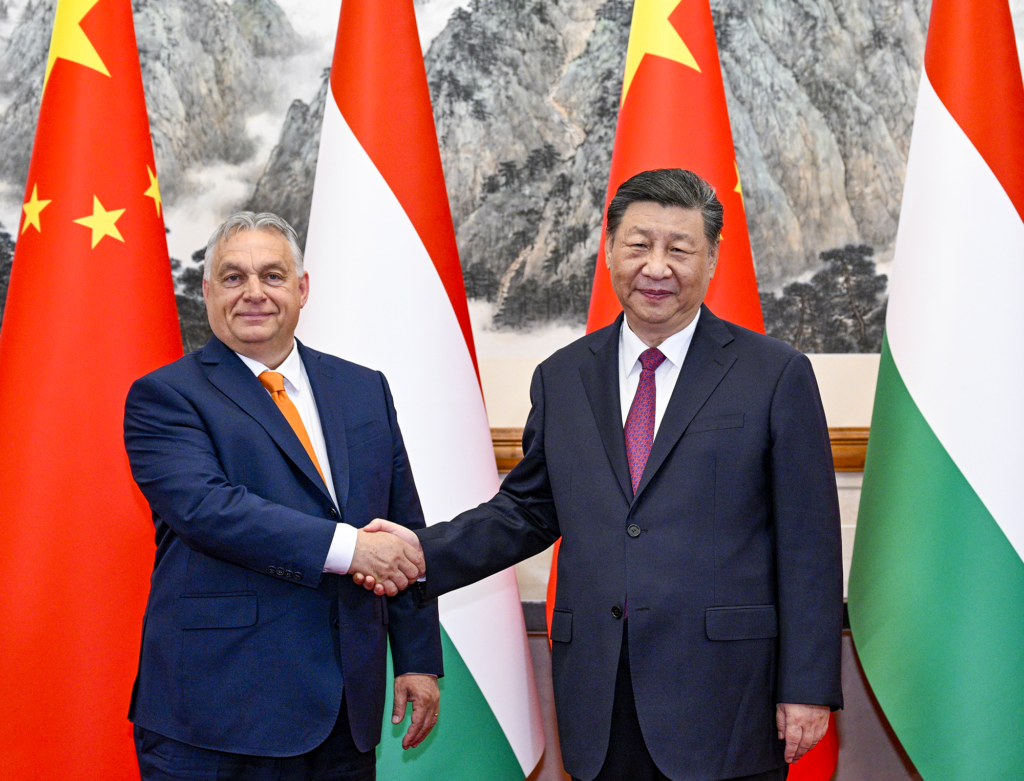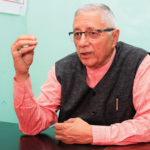Chinese President Xi Jinping met with visiting Hungarian Prime Minister Viktor Orban in Beijing on Monday, where the two leaders exchanged in-depth views on the Ukraine crisis.
Orban’s “sudden” and “surprise” trip to Beijing, as some media described it, came on the heels of trips to Moscow and Kiev last week. He described these trips as a “peace mission.”
Some Chinese experts said his “shuttle diplomacy” could help amplify some pragmatic voices within the EU.
Orban’s visit to China came after Hungary assumed the rotating presidency of the EU. Amid the existing differences between China and the EU in areas such as electric vehicles, this visit reflects a rational and pragmatic voice in Europe, experts noted.
Orban briefed Xi on his recent visits to Ukraine and Russia. President Xi expressed appreciation for Orban’s efforts in promoting a political settlement to the Ukraine crisis and elaborated on China’s relevant views and propositions.
Xi stressed that an early ceasefire and a political settlement are in the interests of all parties, saying that the priority is to cool down the situation through observing the three principles of no expansion of the battlefield, no escalation of fighting, and no fanning of flames by any party.
Xi called on the international community to create conditions and provide support for the resumption of direct dialogue and negotiation between the two sides, saying that only if all major countries bring positive rather than negative energy can a ceasefire in this conflict emerge as soon as possible.
“China has been actively promoting peace talks in its own way and encouraging and supporting all efforts conducive to a peaceful settlement of the crisis,” Xi said, adding that the basic propositions from China and Hungary and the direction of their efforts are the same, and China is willing to stay in communication with Hungary and all relevant parties.
Shuttle diplomacy
“On the Russia-Ukraine conflict, particularly regarding European security, Orban is part of a minority within the EU. He advocates resolving the conflict through peaceful and political means,” Ju Weiwei, deputy director of the Central and Eastern Europe Office, Institute of European Studies of the Chinese Academy of Social Sciences, told the Global Times on Monday.
Despite Hungary’s dual membership of both the EU and NATO, Orban opposes providing military aid to Ukraine and is clearly against the rapid inclusion of Ukraine into NATO and the EU, believing it would be detrimental to European security, Ju said, noting that he also supports political communication between the EU and Russia to resolve the conflict.
Orban’s latest trip to Moscow also angered some European Union leaders, Reuters reported on Friday, who warned against appeasing Russia and said Orban did not speak for the EU. An anonymous EU diplomat was quoted as saying in the report that Orban’s trip meant that skepticism within the bloc about Hungary’s presidency was “unfortunately justified – it’s all about promoting Budapest’s interests.”
Regarding the practical impact of Orban’s recent shuttle diplomacy, there has always been a balance between the rotating presidency of the EU and EU institutions, and the role of the former is to push its main agenda during its six-month term, primarily focusing on domestic affairs, Cui Hongjian, a professor with the Academy of Regional and Global Governance with Beijing Foreign Studies University, told the Global Times on Monday.
“The EU is currently in a special period where the boundaries between internal and external policies are blurred. Orban has seized this opportunity to further expand the powers of the rotating presidency under these special circumstances,” Cui said.
Hungary has long had conflicts with EU institutions, and after taking the rotating presidency role, Orban immediately initiated a sudden round of shuttle diplomacy, which sparked significant opposition within the EU, with some EU politicians emphasizing that his actions do not represent the EU, Cui noted.
“This was aimed at weakening the impact of Hungary’s diplomacy,” the expert said, noting that there is likely to be a “disinfection” process within the EU to reduce the impact of Hungary and this visit.
As for the EU’s future stance on the Ukraine issue, much will depend on the NATO summit, which will set the tone for security and then be reflected in subsequent EU policies, the expert added.
Positivity for China-EU relations
During the meeting on Monday, Xi congratulated Hungary on assuming the EU presidency, emphasizing that there are no geopolitical conflicts or fundamental clashes of interests between China and the EU.
The relationship between China and the EU holds strategic significance and global influence, and it should maintain stable and healthy development to jointly address global challenges, Xi said.
Xi also hopes that Hungary, as the rotating presidency of the EU, will play an active role in promoting healthy and stable development of China-EU relations and achieving positive interactions.
In the face of the current turbulent international situation, China not only loves peace but has also put forward a series of constructive initiatives, proving with its actions that it is an important stabilizing force for promoting world peace, Orban said.
Hungary highly appreciates and values China’s role and influence and is willing to closely engage in strategic communication and cooperation with China. It also advocates strengthening cooperation with China, opposes forming “small circles” and bloc confrontations, and is eager to use its tenure as the rotating presidency of the EU to actively promote the healthy development of EU-China relations, the Hungarian leader said.
Amid recent China-EU trade frictions, Hungary’s positive perception of China stems from a desire to actively develop relations, especially in pragmatic cooperation, Ju noted.
“This includes economic and trade relations, investment, cultural exchanges, and development plans across various fields. This approach is evidently different from the current stance of the EU on some issues, such as imposing tariffs on Chinese electric vehicles,” Ju said.
Some experts said that Hungary hopes to leverage its position as the rotating presidency of the EU to promote pragmatic cooperation and mutual understanding between China and Hungary, further advancing these aspects to the EU level.
“Orban’s visit also reflects the gradually amplifying rational and pragmatic voices within the EU,” Dong Yifan, a research fellow at the Institute of European Studies, China Institutes of Contemporary International Relations, told the Global Times on Monday.
Regarding the key issue of electric vehicles, Hungary and other EU countries are beginning to take a more practical and rational approach to the changes in the industrial structures of China and Hungary, as well as the complementary economic and trade relations between China and the EU, Dong said.
“This significant visit helps to amplify these rational, friendly, and cooperative voices within the EU,” he added.
Global Times




